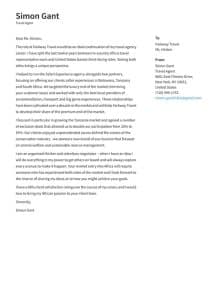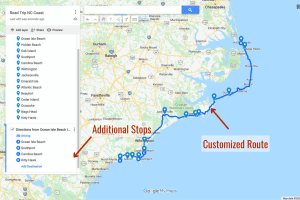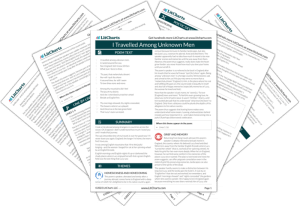Welcome to Hosteliest, your trusty guide to Hotels and Travel. Today, we’re tackling an unconventional yet vital topic: “Travelling and Brain Tumours Fact Sheet”. Step into a journey of understanding the intersection of health and travel. Join us in unraveling this complex issue.
Title: Everything You Need to Know: Travelling and Brain Tumours Fact Sheet
Ever wondered how travelling might affect someone with a brain tumour? The connection between travel and brain tumours can seem complex, but don’t worry – we’ve done the extensive research for you. This comprehensive Travelling and Brain Tumours Fact Sheet will help you understand all the ins and outs.
The Challenge
The topic of brain tumours is vast and diverse. As such, there is much to consider when travelling. The question is: How can you make travel stress-free and safe while battling a brain tumour? Read on as we unravel this fact sheet for travellers with brain tumours.
Understanding Brain Tumours
Firstly, understanding brain tumours is crucial. They are abnormal growths in the brain cells. Some are benign (non-cancerous), while others are malignant (cancerous). Treatment depends on the type, size, and location of the tumour, which may include surgery, radiation therapy, or chemotherapy.
Travelling with a Brain Tumour
Now that we have a basic understanding of brain tumours, let’s dig into how it affects your travel plans. It is important to know that travelling with a brain tumour is not impossible. However, it requires special care and considerations.
Pre-Travel Medical Consultation
Always consult your healthcare provider before planning any trip. Discuss your current condition, treatment plan, and any potential risks involved. It’s also a good time to talk about travel insurance options that cover pre-existing medical conditions.
Managing Symptoms while Travelling
Symptoms of a brain tumour can vary greatly from person to person. Common symptoms include headaches, seizures, balance issues, and cognitive changes. It’s crucial to manage these symptoms effectively during your travel. A well-prepared plan can help you deal with unexpected situations smoothly.
Accommodation Considerations
When travelling with a brain tumour, accommodation plays a pivotal role. You might need special facilities such as wheelchair accessibility, quiet rooms, or closer proximity to medical assistance. Make sure you inform the hotel about your condition so that they can cater to your needs effectively.
Travel Insurance
Another aspect of our travelling and brain tumours fact sheet is the importance of travel insurance. It provides an essential safety net if things don’t go as planned. Look for policies that cover pre-existing conditions, medical emergencies, and cancellation due to health issues.
Conclusion
Travelling with a brain tumour may seem daunting, but it doesn’t have to be. The key lies in meticulous planning, full-disclosure to the necessary parties, and flexibility. With the right prep, your journey can be as smooth as possible. This Travelling and Brain Tumours Fact Sheet is your initial step towards understanding your situation better.
Remember, every journey begins with the first step. Equip yourself with the right knowledge, consult your doctor before making any plans, and you are already on your way to your destination! So where is your next adventure taking you? Make sure you stay tuned as we bring you more comprehensive guides and fact sheets like this. Safe travels!
Unraveling the Facts: Traveling with Brain Tumours – A Comprehensive Guide for Enriched Hotel and Travel Experiences
Traveling with a Brain Tumour: Understanding the Basics
When living with a brain tumour, travelling can seem daunting. However, it is entirely possible to have an enriched travel and hotel experience while managing your health condition. It’s all about planning ahead, making informed decisions, and taking adequate precautions.
Pre-travel Consultation
One of the first steps to travel safely with a brain tumour is to consult your healthcare professional. Together, you can review your status and discuss any precautions you need to follow for a comfortable journey. Your doctor can also provide details regarding necessary medications, nearby healthcare facilities at your destination, and emergency contact numbers.
Choosing the Right Hotel
A crucial aspect for individuals travelling with a brain tumour is selecting the right hotel. Look for hotels that offer healthcare facilities or are positioned close to one. Ensure they have elevators, if climbing stairs proves challenging for you. Inquire about their provision for dietary restrictions if you’re following a specific diet.
Planning Your Travel Itinerary
Plan your itinerary sensibly. Travelling with a brain tumour doesn’t mean missing out on the fun – it simply means you may need to pace yourself differently. Include enough rest days between activities and consider your comfort levels while scheduling sightseeing tours.
Travel Insurance
Travel insurance is not just an option, but a necessity when travelling with a medical condition. It covers unforeseen medical costs, cancellations, and also offers assistance services during emergencies.
Pack Smartly
When packing, make sure to keep all your essential medications and prescriptions within easy reach. Also carry a medical alert card, specifying your condition and emergency contact numbers.
While You Travel
During your journey, stay hydrated, stretch regularly and move around as much as you can to prevent discomfort. If flying, consider wearing compression socks to prevent deep vein thrombosis (DVT).
At Your Destination
Once you’ve reached your destination, give yourself time to adjust. Don’t rush into activities as soon as you arrive – take it slow and let your body adapt to the new environment.
In conclusion, having a brain tumour doesn’t mean putting a stop to your travel dreams. On the contrary, travelling can offer therapeutic benefits and enrich your life experiences. With informed planning, the right precautions, and a positive outlook, individuals with brain tumours can indeed have enriched hotel and travel experiences.
Understanding Brain Tumours and the Importance of Proper Planning
Brain tumours, benign or malignant, can significantly impact one’s plans, potentially leading to constant adjustments in their lifestyle. This is particularly true when it comes to travelling. When planning a journey, individuals diagnosed with brain tumours must consider specific factors such as the availability of medical facilities, proximity to affiliates of their home hospital, and travel insurance coverage. Travel arrangements should therefore be made with utmost care and consultation with their healthcare team.
Making Accommodation Choices: What to Consider
Accommodations play a key role in the traveller’s comfort and wellbeing. For patients travelling with a brain tumour, the location, accessibility, and services of a hotel become even more critical. It is wise to look for accommodations close to medical facilities, for easy reach in case of emergencies. In addition, the hotel should have facilities that can make a patient’s stay comfortable, such as room service, laundry services, and a 24/7 help desk. The right choice of hotel can significantly improve the travelling experience.
Ensuring Safe and Healthy Travels: Tips and Precautions
Travelling with a brain tumour requires extra precautions to ensure a safe and enjoyable trip. Before embarking on your journey, consult your doctor about your travel plans and seek advice on managing symptoms while away. Also, carry with you all necessary health records and prescribed medications. Be mindful of your diet and hydration levels during the trip. Remember, your goal is to indulge in the pleasure of travelling without compromising your health.
Frequently Asked Questions (FAQ)
“What special accommodations are available at hotels for guests travelling with a brain tumour?”
Many hotels strive to provide inclusive and comfortable accommodations for guests with all types of health conditions. For guests travelling with a brain tumour, you can expect hotels to offer several special accommodations to ensure comfort and assistance.
Accessible Rooms: Hotels often have specially designed rooms for guests with disabilities. These rooms usually come with features such as wider doorways, more floor space for mobility, accessible bathrooms with grab bars, and emergency alarms.
Medical Assistance: Hotels sometimes offer medical assistance to their guests. This service can range from providing access to on-call doctors and nurses, arranging for transport to and from hospitals or clinics, to keeping emergency medical equipment at hand.
Special Dietary Needs: For those guests who may have dietary restrictions due to their condition or medication, many hotels are open to customizing meals according to the guest’s needs.
Quiet Zones: Additionally, some hotels have “quiet zones” for guests who might need restful environments due to sensitivity to noise, which is sometimes an associated symptom of a brain tumour.
Concierge Services: For those who may require additional help in planning their itinerary or need wheelchair-accessible transportation to local attractions, concierge services at the hotel can prove to be extremely helpful.
Remember, it’s always best to contact the hotel directly prior to booking to discuss any specific needs or arrangements. They will be able to provide the most accurate information and do their best to accommodate your needs.
“Which travel insurance policies provide coverage for travellers diagnosed with a brain tumour and what do they entail?”
Obtaining travel insurance for people diagnosed with a brain tumor can be challenging, but not impossible. Specialist providers cater to clients with existing medical conditions, ensuring they are adequately covered during their travels. However, specific coverage, terms, and costs depend on the severity of the condition, treatment, and individual policy.
1. Pulse Insurance: An example of a company offering specialist cover, Pulse Insurance provides tailor-made policies that consider all aspects of your health. Pulse Insurance does not exclude any condition, including brain tumors. However, services are subject to a full medical screening and underwriting.
2. AllClear Travel: AllClear offers cover for a broad range of pre-existing conditions including brain tumors. They provide comprehensive medical screening and offer three levels of cover to give you options dependent on your needs and budget.
3. Free Spirit Travel Insurance: Free Spirit is another provider specialising in cover for those with pre-existing medical conditions. Their ‘Super’ level policy includes cover for emergency medical expenses up to £10 million and cancellation cover up to £5,000.
4. Goodtogoinsurance.com: Goodtogoinsurance offers travel insurance with cover for all types of brain tumors, regardless of whether you’re awaiting surgery, recovery or undergoing treatment.
It’s crucial to remember that these policies require full disclosure about your medical condition. Failure to disclose might result in rendering your policy invalid.
Navigating insurance needs with such health conditions can be complex. Always consult your healthcare provider about your travel plans and speak to a qualified insurance provider to ensure you have adequate and appropriate coverage.
“What are some practical tips and advice for individuals journeying with brain tumours, especially when staying in hotels and engaging in travel activities?”
Individuals journeying with brain tumors face unique challenges while traveling and staying in hotels. Nevertheless, with adequate planning and precautions, they can still embark on fulfilling travel adventures. Here are some practical tips and advice:
– Consult with the Medical Team: Before setting off, have a thorough discussion with your medical team about your travel plans. They may provide specific guidelines based on your condition or suggest essential medical supplies to carry.
– Travel Insurance: It is essential to secure a travel insurance policy that covers pre-existing conditions. Ensure it includes provision for medical evacuation.
– Selecting an Appropriate Hotel: Stay in a hotel that can cater to your specific needs. Many accommodations offer disability access, on-call medical services, and other useful amenities.
– Adequate Rest: Schedule periods of rest into your itinerary. Ensure you have a comfortable, quiet place to rest in your hotel and avoid exhausting activities.
– Medication Management: Always carry enough medication for the duration of your trip, plus extra in case of delays. Maintain a regular medication schedule regardless of time zone changes.
– Frequent Breaks: On travel days, plan for frequent breaks for rest and hydration. Avoid long periods of continuous travel when possible.
– Emergency Contacts: Always have the local emergency number and location of the nearest hospital handy. Share your travel plans with close friends or family members so they can check on you.
Remember that the ability to travel largely depends on the individual’s condition and the progression of the tumor. This makes continuous communication with healthcare professionals and personal judgement indispensable. With these precautions, individuals journeying with brain tumors can enjoy enriching travel experiences.
In conclusion, the journey of those travelling for the treatment of brain tumours is surrounded by many challenges yet filled with hopes and determination. The utmost priority during such travels should always be the patient’s health and well-being. Therefore, it is essential to choose the right accommodation which can provide comfort and convenience. It is imperative to select a hotel that is close to medical facilities, has accessible services, and can cater to their specific needs.
Savvy travellers understand the importance of good location, cleanliness, and offerings of a hotel when making their choice. Another crucial step is planning the travel. Be it choosing the right modes of transportation or packing the right medicines, every minute detail should be taken into consideration. Efficient planning can make the travel comfortable and hassle-free for the patient.
Lastly, it is incredibly significant to stay positive. Dealing with a brain tumour is a strenuous journey, but remember, there are numerous individuals around the globe who are battling or have battled the same. Talking to fellow travellers, sharing experiences and understanding different perspectives can sometimes work miracles. So don’t shy away from creating connections and seeking support.
Keep in mind, travelling in such circumstances is more than just a physical journey, it’s a journey towards hope, resilience, and survival. So, let’s embrace this journey with courage and an open heart. Safe travels!
Error: El post actual no se encuentra en el array de posts.















































































































